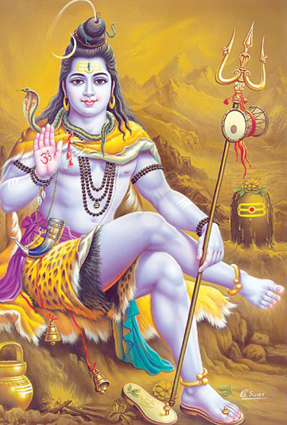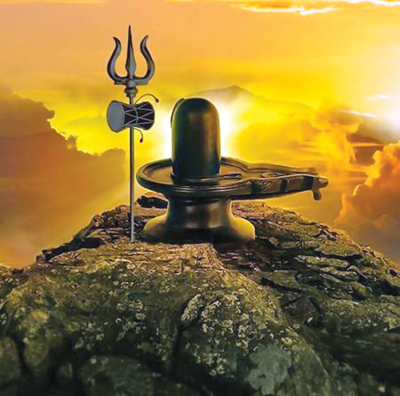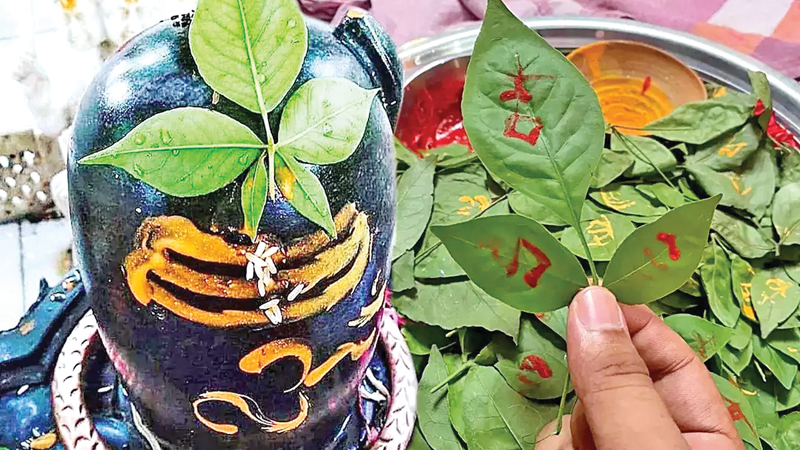On March 8, Hindus all over the world will celebrate Maha Shivarathri, which literally translates to ‘Great Night of Shiva.’ It is a night auspicious to legions of Hindus all over the world, the one night in the year when devotees stay up all night, chanting Shiva’s name (Om Namah Shivaya), or singing songs in praise of him.
The day falls on the 13th or 14th day after the full moon, in the month of Magha, corresponding to either February or March in the Western calendar. It is the night before the New Moon, when the Moon has all, but waned.
Hindus believe that this is a very powerful time of the year, when mantras chanted or spiritual exertions undertaken are magnified several-fold in their beneficence. Therefore, they fast all day and stay up all night, trying to focus their minds on Shiva.
 There are several stories as to why Maha Shivarathri is so auspicious. Hinduism, having originated in the large landmass of India, has several variants in its stories. The several different people and races, in different areas of the country, have variations of the story to suit their beliefs and temperaments.
There are several stories as to why Maha Shivarathri is so auspicious. Hinduism, having originated in the large landmass of India, has several variants in its stories. The several different people and races, in different areas of the country, have variations of the story to suit their beliefs and temperaments.
Among the diverse stories as to how Shivarathri came to be venerated, here are some of the more popular ones: It is the night of the marriage of Shiva and his consort Parvati; It is the night when Shiva danced his poweful Tandava dance of destruction in a roiling rage; It is the night that Shiva claimed to be his favourite, when Parvati asked him which time was most auspicious for people to pray to him; Though Hinduism has a wide pantheon of Gods and Godesses, the Supreme Trinity consist of Shiva, Vishnu and Brahma.
Brahma does not enjoy widespread worship but the other two do and depending on which deity they choose to call supreme, followers align themselves as Saivaites (devotees of Shiva) or Vaishnavaites (devotees of Vishnu).
And each faction has its own stories to tell about why their chosen God is the Supreme one, and why Brahma is not worshipped with the same fervour.
Favourite version
Most Sri Lankan Hindus being Saivaites, this is their favourite version of the Shivarathri, as told in the Shiva Purana (religious text devoted to Shiva):
One day, Vishnu and Brahma had an argument over which of them was the superior deity. They took their dispute to Lord Shiva and asked him his opinion. Shiva told Vishnu to find his feet and Brahma to find his head, and then magnified himself rapidly into the cosmos. Whichever of them came back successful from the quest first, was to be the winner.
Vishnu changed himself into a wild boar and went burrowing into the Earth. Brahma changed himself into a swan and flew up into the sky. Both of them kept going down and down and down, and up and up and up, but simply could not reach their destinations.
Finally Vishnu conceded defeat and came back up. Brahma, however, was not quite so graceful and honest.
He too realised that he was never going to reach his destination but was too proud to accept defeat. On his way up, he saw a Screw Pine flower (Thalampoo in Tamil) from Shiva’s locks of hair, falling down. He caught the flower and asked it to bear false witness for him; to confirm that he had indeed attained Shiva’s head and obtained the flower from there as proof.
When he came back with this story however, Shiva, the all-knower was not pleased and cursed him as no more being worthy of worship. As for the Screw Pine flower, that had borne false witness, it too was cursed to be thereafter never used in worship.
And thus was born the Maha Shivarathri, the night of Shiva’s greatness, when both Vishnu and Brahma spent all day and night in the search of his ‘beginning’ and his ‘end’ and could not do it.
Mythological stories aside, Hindus believe that this is a special time of the year which is very portent for spiritual practices. Hindu astrology tracks planetary alignments closely and believes the stars are particularly favourable to do all night meditation on this day.
Significance
A Hindu priest, when asked the significance of Shivarathri, cited this oft told lore locally, to highlight its significance:
A hunter who had gone into the forest to hunt, suddenly found himself being the hunted. A tiger started chasing him but he managed to get up a tree first. In his agitation, he did not even notice that it was a Bael (Bilva) tree, the leaves of which are sacred to Shiva or even that there was a Shivalingam underneath the tree. Both the tiger and the man kept up an all night vigil to see who would tire first. It happened to be the night of Shivarathri, which the hunter was unaware of.
 To stave off his agitation, he unconsciously started plucking the bilva leaves and dropping them one by one. His canteen of water also happened to be leaky and leaked out water, drop by drop. Since he was sitting directly above the Shivalingam, he thus conducted an Abhisekam (ritual worship) of Shiva using his favourite leaves and water, on his most auspicious night – all without knowing it.
To stave off his agitation, he unconsciously started plucking the bilva leaves and dropping them one by one. His canteen of water also happened to be leaky and leaked out water, drop by drop. Since he was sitting directly above the Shivalingam, he thus conducted an Abhisekam (ritual worship) of Shiva using his favourite leaves and water, on his most auspicious night – all without knowing it.
Great yogic powers
Merit accrued to him nevertheless and he attained great yogic powers and became spiritually enlightened. According to the priest, “This goes to show the benefits of worshipping on the Shivarathri. What cannot be attained on any other night can be attained on this night with only a little effort.”
Of the 12 Shivrathris observed in any given year, Maha Shivrathri is considered especially auspicious. Shivrathri is supposed to be the night of convergence of Shiva and Shakti, which in essence mean the masculine and feminine energies that balance the world. In Hindu culture, this is a solemn festival that marks the remembrance of ‘overcoming darkness and ignorance in life’.
Different legends, throughout history, describe the significance of Maha Shivrathri and according to one of them, it is on this night that Lord Shiva performs his cosmic dance of ‘creation, preservation and destruction’. Another legend dictates that on this night, offerings of Lord Shiva’s icons can help one overcome and let go of their sins and start on the path of righteousness, allowing the individual to reach Mount Kailash and achieve ‘moksha’.
Unlike a lot of Hindu festivals, Maha Shivrathri is not an overtly joyous festival. This is a night reserved for self-reflection and introspection for the purpose of growing and leaving behind all things that hinder our success. Many devotees also observe a full day fast on Maha Shivrathri, eating only on the next day after bathing. The fast is observed not only to attain Lord Shiva’s blessings but also as a test of one’s own determination.






